Mind and Iron: How the WGA strike just set a dramatic new tone for the AI age
Also, the jeremiah who called for an AI pause last spring checks back in. And Google tries to redefine how we use the Internet.
Hi and welcome to Mind and Iron, the place where tech and future news gets human. I’m Steve Zeitchik, longtime denizen of The Washington Post and Los Angeles Times, and your tour guide through this magical and only occasionally haunted house.
The goal here every Thursday is simple: to spotlight the ways advances in science, business and tech will affect humans. We’re telling stories that aren’t getting enough play out there, and translating the ones that are so that it becomes a lot clearer what we should be fretting over, getting excited about or simply ignoring.
[Listen to this intro]
Also, we’ve added a nifty new audio feature this week. If you’re reading this text and would rather be listening to it — you’re at the gym, in the car, wherever — you can now hear many of the items read by the author by simply clicking play at the top of the piece. Just one of multiple new features coming at you in the weeks and months ahead.
Quick reminder to sign up here — it’s the best thing you can do for your inbox, and our collective sense of bewilderment.
And please consider pledging your support here.
This week did not begin quietly — reps for the more than 11,000 striking Hollywood writers who were worried about what AI would mean for their jobs came to an agreement on a new contract with studios. The contract sets the tone for whole swaths of other workers as they face off with management over similar automation fears. So did it do enough? Our breakdown below.
Also, would you go for a new phone feature that allows you to make everyone in a photograph seem like they smiling even if they weren’t? Like, if you could change the expressions of everyone in that family photo to something more pleasing, would you? And should we? A look at what will be either the ultimate filter or the end of photography as a meaningful document as we know it.
Meanwhile, Google gets a lot closer to insinuating AI deeper into our lives. And remember that industry-wide letter last spring calling for a six-month pause on AI development that no one listened to? The man who organized it weighs back in.
He provides the future-world quote of the week.
“You’ve started to get politicians asking tough questions.”
—Max Tegmark, who led the letter asking Big Tech to pause new AI research, trying to keep the glass half full
Now let's get to the messy business of building the future.
IronSupplement
Everything you do — and don’t — need to know in future-world this week
Mooning over Gemini; Is the race to the AI bottom gaining speed?; What happens when every family photo is a pseudo-happy one
[Listen to this story]
1. ABOUT A QUARTER-CENTURY AGO GOOGLE changed the world as we know it.
We use the term “search,” but that doesn't begin to cover it. The then-startup from a couple of Stanford alums took the growing trove of knowledge online and gave us the means to root around and discover…the disease potentially ailing us, the philosophical concept eluding us, the celebrity crush that had been lost to us until their next divorce. And of course anything else anyone had weighed in on, which prompted others to weigh in, and eventually to build the Web as we know and hatelove it. Not a stretch to say Google changed how we learn, think and even live.
All this is a pretty high bar to set for Google’s new venture, which is nonetheless being launched with comparable levels of hype. Sometime in the next few months the firm’s DeepMind AI division will unspool Gemini, a competitor to OpenAI’s GPT systems/ChatGPT. Google as a company is of course radically different from those 1999 days, and the world quadruply so. But still the buzz grows — The Information recently ran a story saying Google has begun giving a “small group of companies access to an early version” of Gemini, which will be conversational like ChatGPT is conversational. It called the release “highly anticipated.”
(Gemini will be different from Google’s more lightly used Bard, in part because it will combine images and text, allowing for a whole other plane of interactions.)
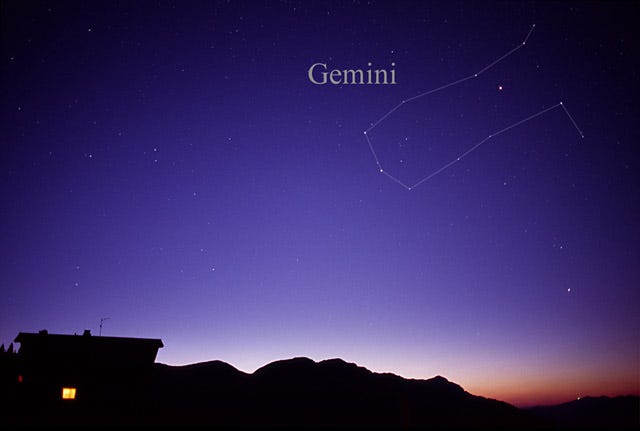
At the most basic level, what Gemini could change is how we interact with the Web’s information base. Right now using Google still means needing/getting to employ a kind of human discernment — deciding whether the result we land on is relevant or from a trustworthy source, or all the critical-thinking skills called upon when we click/don’t click on a link.
A conversational AI system does away with that — it just gives us the answer, having already done all the work of finding the best info and then distilling it down to a customized response. It takes out all those intermediate steps of finding and interpreting. And if that seems unnecessary, now you know how your grandmother felt back in 2000 when she asked why we needed all this Internet and search-engine stuff when we could just use an encyclopedia. Information-seeking gets ever-less frictional. And we’re about to hit another ice-slick stretch of the track.
But helping us learn what’s already out there is just one side of the AI coin — it’s the ability to create that stands the tech apart. Gemini wants to ensure our inputs generate the perfect piece of text or insanely on-point image simply because we asked for it. And without us needing to do too much work translating what’s in our heads.
Instead of just being judged by how well it found what we think we’re looking for, Google: AI Era Edition will be measured by how perfectly it created what we vaguely know we want to see.
Whether Gemini will be better at this than OpenAI’s GPT iterations is an interesting question (though not nearly as interesting as some of its flame-throwing principles seem to think it is). Primarily it comes down to the strength of the data on which Google is training it — “you are what you eat” never resonated so much as it does with AI training models.
At best (don’t hold your breath) Gemini will make AI much improved, without any of the “hallucinations” current versions have on the search end and with a lot more accuracy on the creation end — ushering in a new age in which we can get the exact information or new image we seek simply by asking naturally.
At worst it will just be more of the same.
Will Google do to its current competitors what it once did to Excite and Yahoo? Or is the company just one more desperate ship tossing frenziedly on this new technological sea, with no actual plan on how to make our lives easier? For now that’s a question even the best AI can’t answer.
2. SPEAKING OF TECH MEGALITHS GOING ALL OUT ON AI ADVANCEMENTS, remember back in late March when thousands of notable figures — including Google DeepMind CEO Demis Hassabis — signed a letter warning of the unknowns of AI and calling for everyone to “immediately pause for at least 6 months the training of AI systems more powerful than GPT-4?”
The tech CEOs don’t because, well, see the previous item.*
But how does the man who organized the campaign feel it went now that its term is over?
The Guardian checked back in with Max Tegmark — the MIT professor and co-founder of the Future of Life Institute who has written some epic AI-risk essays — who led the letter initiative. The paper found him…surprisingly chipper.
“The letter has had more impact than I thought it would,” he said. “I felt there was a lot of pent-up anxiety around going full steam ahead with AI that people around the world were afraid of expressing for fear of coming across as scare-mongering Luddites. The letter legitimized talking about it; the letter made it socially acceptable.”
He noted that, “you’ve started to get politicians asking tough questions” — a quantifiable benefit and verifiably true statement given the Senate hearings et al.
But everyone from Google to OpenAI** to Meta still seems to be speeding ahead on the race that GPT started — wouldn’t that make it a failure? According to the Guardian, “Tegmark said he had not expected the letter to stop tech companies working towards AI models more powerful than GPT-4.”
So I guess the goal was more prophylactic — like, slow them down a little? Or make them cogitate about the dangers as they raced ahead?
It’s hard to prove a counterfactual — what would the efforts look like if there was no letter. But doesn’t seem like the world with the letter is so great either.
In the Guardian chat Tegmark did renew his call for another pause. I imagine we’ll get another one in six months. And another one after that. Pretty soon our AI companions can just sign the letter for us.
*Yeah, I know, Hassabis will probably say Gemini is not more powerful than GPT-4. Yet is aiming to thrash it.
** For a truly eye-popping example of how not slowing down these companies are, check out OpenAI chairperson Greg Brockman on a panel last week — with Tegmark, Elon Musk and Benjamin Netanyahu, of all people — talking about how “2030 is when the merge [when AI can fully function like a human] happens,” a completely bonkers prediction that nonetheless shows how hard the company is going beyond GPT-4.
3. AH, THE FAMILY PHOTO, THAT FROZEN-IN-AMBER DEPICTION OF EVERY ANNOYANCE, AWKWARDNESS AND FACIAL CURDLE FROM THE HOLIDAY DINNER NOW IMMEMORIALIZED FOR THE REST OF TIME.
But what if you had a tool that could change all that? So that every photo depicts not events as they happened but as we wish they happened? Every frown now a smile; every distracted lookaway a warm gaze. Seamlessly, so no one was the wiser. Would you?
That question could be the ultimate Rorschach test separating realists and idealists. It’s also not a hypothetical. According to the blogs 9to5 Google and 91Mobiles, Google’s new Pixel 8 phone will allow faces to be, er, adjusted just like that. The company appears to have enabled the blending of multiple images, presumably with the help of AI, to create the deepfake effect. (Google be busy this week!)
Here’s an example, from 9to5 senior editor Ben Schoon.
One more digital innovation that gives us the power to manipulate. And one more step toward what I think will be one of the biggest hallmarks of the AI age — an inability to tell the real from the simulated.
Comparisons are flying to that classic “Office” bit where Carell desperately uses Photoshop to try to make the Dunder Mifflinites seem happy. But he failed miserably. This feature actually looks pretty convincing. The AI Age: allowing us to run where Michael Scott only walked.
And there’s a real consequence. This feature will make many a parent, spouse or trip organizer feel better about the photo in the moment, and that’s not nothing. It will just make the photo a little useless to future generations decades later. “Grandpa was so damaged by the war; you could see it in his eyes” becomes “We don’t know if Grandpa ever had a hard day, because he’s so damn happy in every photo.”
Or even to the same family a year later — “I don’t remember having that good a time at that theme restaurant...”
Though who knows? Belief is reality, and maybe making a family member look the way we wished they did will convince the whole crew that that’s how it went down. The only disagreeing voice will be reality, and at some point who really cares what that old curmudgeon has to say.
[9to5 Google and 91Mobiles]
The Mind and Iron Totally Scientific Apocalypse Score
Every week we bring you the TSAS — the TOTALLY SCIENTIFIC APOCALYPSE SCORE (tm). It’s a barometer of the biggest future-world news of the week, from a sink-to-our-doom -5 or -6 to a life-is-great +5 or +6 the other way.
Here’s how the future looks this week:
GOOGLE TRIES TO GOOGLIFY THE AI WORLD: Not the worst thing — IF they’re successful. +1
TECH EXECUTIVES IGNORE THE WARNINGS ON AI: What’s the German word for not great but not surprising? -1.5
YOU CAN SOON INSTANTLY MAKE EVERYONE SMILE IN YOUR PHOTOS: Bye-bye, 200-year-old medium. -3
HOLLYWOOD WRITERS CAN’T BE REPLACED OR EVEN SUPPLEMENTED BY AI UNLESS THEY WANT TO (SEE BELOW): What’s not to like? +2.5
The Mind and Iron Totally Scientific Apocalypse Score for this week:
-1
The Mind and Iron Totally Scientific Apocalypse Score for this year:
-11.5
MindandIrony
A possibly penetrating, perhaps droll comment on current tech developments
What Hollywood writers just pulled off
Back when AI was becoming an increasingly evident area of concern for Hollywood writers last spring, one fear kept bubbling up over the others: "What if," numerous writers said, "AI is used to write the original script and then they just hire me to come in and do a polish?"
Anyone who has worked in Hollywood knows that polishes are the great forgottens of the entertainment world. Those doing them are the bastards of Burbank, the malcontents of Melrose, the bete noirs of the business, there to do a clean-up job no one wishes had to be done.
And while it's true that the original writer on Hollywood projects can come to feel more beaten up than Apollo Creed in “Rocky IV,” it is often they who get first position on the credits; they who collect the highest fees; and they with whom the movie is associated. And now AI was about to singlehandedly swipe it from all of them.
The Writers Guild settled their five-month strike with the studios this week, agreeing to a new contract that will run through May 2026. (Member ratification will be a formality.)
And two points became clear. First, the writers won a striking victory on behalf of humans in the face of digital automation. And second, the tables were so turned that now it’s the AI that has to worry about being relegated to role of polish person for the screenwriter. And even then, not fully or officially.
On the first: this is the kind of victory that will either set a solid precedent or make other industries scratch their heads in envy at what those crazy Hollywood people could pull off. Hard to imagine GM or Ford management agreeing to take digital automation in their manufacturing process entirely off the table for the next 2.5 years.
Because that’s what the language appears to do. Per the summary released by the WGA:
“AI can’t write or rewrite literary material, and AI-generated material will not be considered source material under the [agreement].” Basically what this means is that the studios can’t use any AI writing for a movie or TV show substantively (the first part) and they can’t even use AI writing in the background to dilute a human writer’s credit technically (the second part). If a new movie is being written, or the script of a pilot is being rewritten, producers have to go out and hire humans to do it.
For the next 2.5 years at least — and who knows what AI will be capable of by then — pretty much no sharp story or crackling dialogue we watch on TV, on streaming or in a movie theater will be generated by a computer.
So sweeping is this clause that in fact it’s hard to imagine why the studios would agree to it. The best I can come up with is that writers’ salaries in the grand scheme of studio expenses is like the yogurt you throw into the shopping cart at the end of a long trip to Whole Foods — barely visible in the total — and the studios made the cool calculation that it was hardly worth prolonging a work stoppage just to avoid paying a few of them. (Indeed, several reports had AI as the last issue to be resolved.)
Keep in mind, too, that the studios made a more squishily worded agreement with the directors, which might allow them a little more wiggle room on AI-generated images and video. Which are often more expensive than words.
Still, all of this makes the story seem like a happy one for those of us concerned about both the role of humans in the digital workplace and the role of soul in our culture’s narratives. But there is one dark spot hovering over the fairy tale.
Which brings me to the second point: nothing in the agreement stops studios from being influenced by AI and then passing that influence along to writers, providing they simply note that’s what they’re doing. “The company must disclose to the writer if any materials given to the writer have been generated by AI or incorporate AI-generated material,” the WGA language says.
Or in Hollywood terms: AI can be used for notes.
And notes can be a….very strong suggestion on the part of the studios. A creator can have a hard time pushing back against an executive with such formidable impulses. And AI, with its air of invulnerability? Probably even more so. One can imagine a situation in which a studios deploys an AI to analyze a script, it then calls for a new line, scene or even tone to make the movie more commercially viable, and the writer has no contract protection to stop it.
“This is great starting point, and a foundation I’m really happy we have to build on,” Mark Heyman, a veteran screenwriter of movies including “Black Swan” and “The Skeleton Twins,” said to me. “But I think we need to be realistic about how AI is going to be an increasingly large part of this [moviemaking] process.”
Even if AI did become part of the notes flow, though, it would mean that the tech would essentially be the polishers — the clutzes of Culver City, the orphans of Olympic — while the human takes the more desirable position of original screenwriter. A point you can understand the WGA was willing to concede; as another writer put it to me, “most of us have been ‘polished’ by a lot worse than what an AI might do.”
One last thing: Forgotten in all the talk about how studios might use AI to displace the writer is this: what if a writer wants to use AI? Something that could clearly happen — even the most confident scribe doesn’t want to automatically forgo the possibility of a helpful tool.
But studios aren’t giving that away. “If we’re paying you the bigger bucks than we pay an AI,” they reasonably say, “we want to make sure we’re getting you.” So any screenwriter that wants to use AI can do so only “if the company consents,” the contract says.
This is a big if — in part because companies may resist, but more so because what writer would want to ask in the first place? Who wants to tell their boss that the job they’ve lobbied so strongly only they and no machine can do is now being done with the help of said machine?
This might change as AI roles become more clearly accepted/defined. But for now, it’s hard to see a lot of writers, fresh off winning a battle with studios not to hire AI, asking the studios to let them go and use AI.
And that seems like a shame. AI’s role in the writing process is at its infancy, and the idea that it will have absolutely no role to play in our storytelling seems as unfortunate — and as unrealistic — as the idea that it will singlehandedly bang out the next “Godfather.” Humans will write but AI will be there to consult, to give a jolt, to help with shaping. And good writers will know how to use it. Just like they do other tools.
There are still writers that write longhand, in one continuous fountain-pen scroll, and God love ‘em. For most of us chunk writers, though, shuffling and deleting and copy-and-pasting our way into something readable, we couldn’t imagine doing what we do without technology. I suspect AI will increasingly have this writing-buddy role to play as well, giving ideas and laying foundations that writers then use ever-greater personal style to evolve. It might even make writing more colorful and daring as a result.
AI has a part to play in creative efforts — not, hopefully, because companies think it can replace humans, but because humans realize it can help make them more irreplaceable.
A goal perhaps for 2026. In the meantime, we can rest assured humans will be both employed and at the center of the stories we see. A Hollywood ending even an AI couldn’t write.




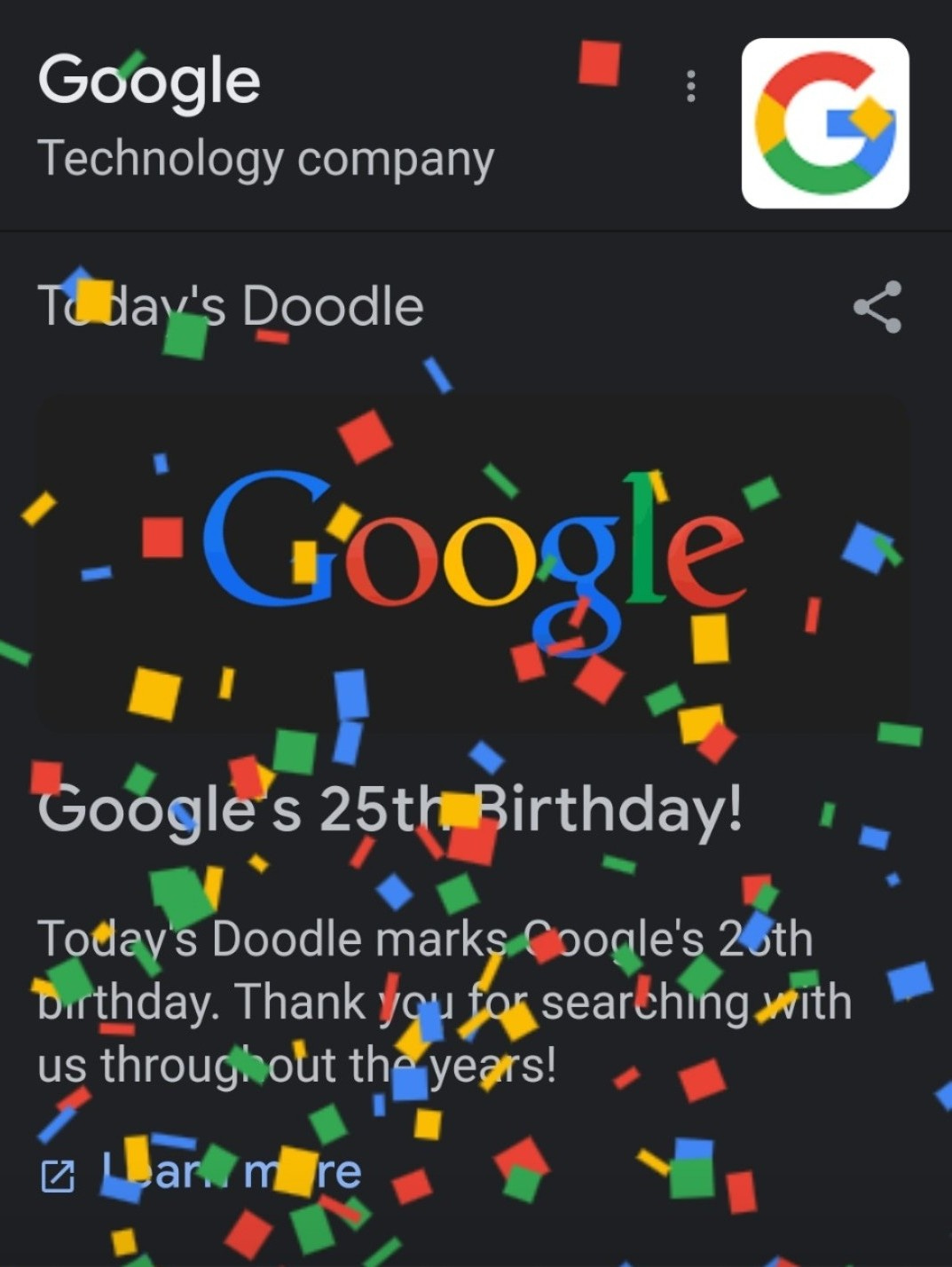

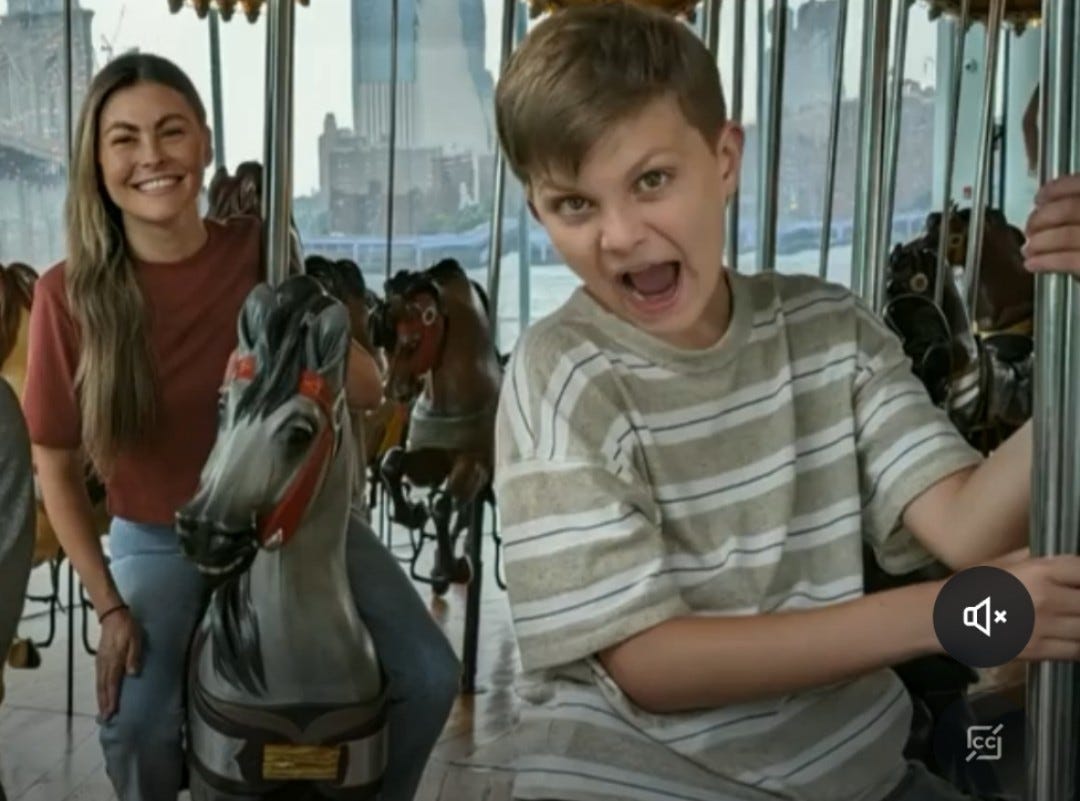

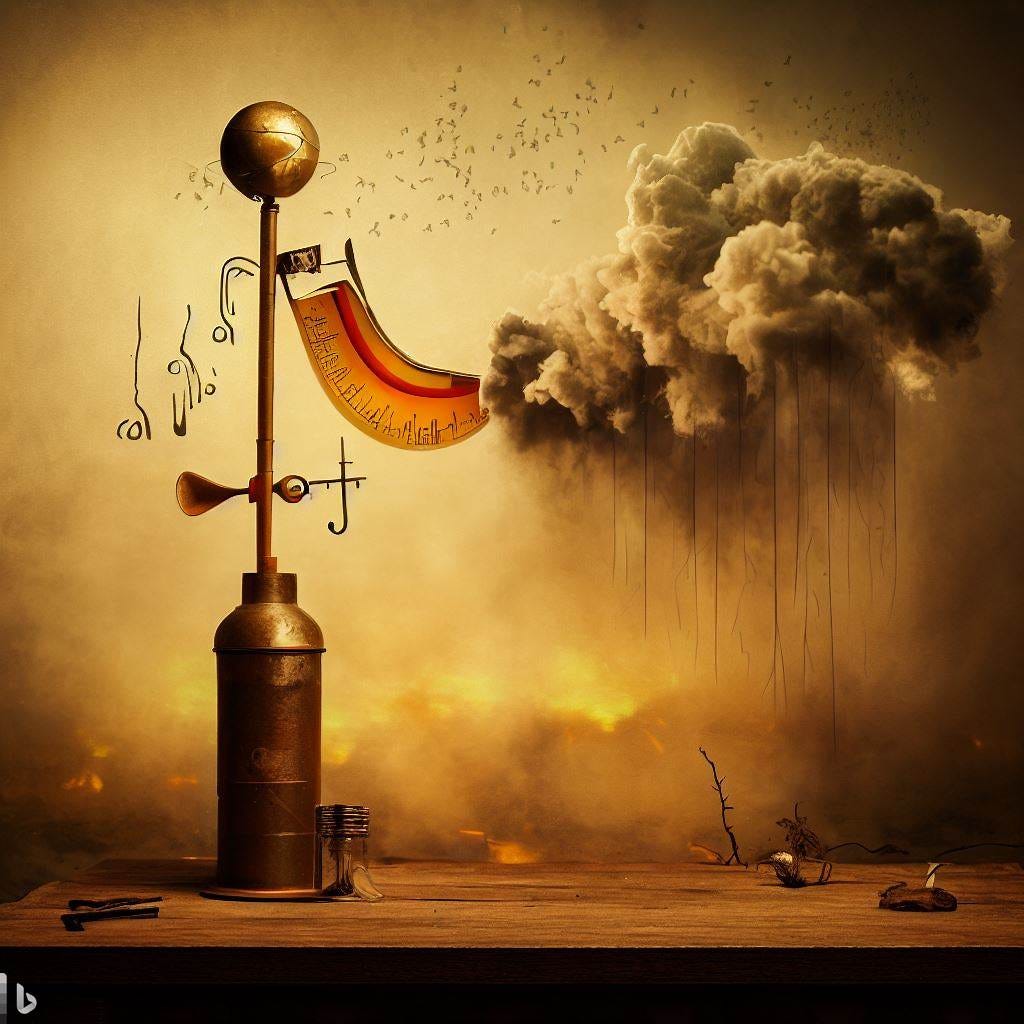
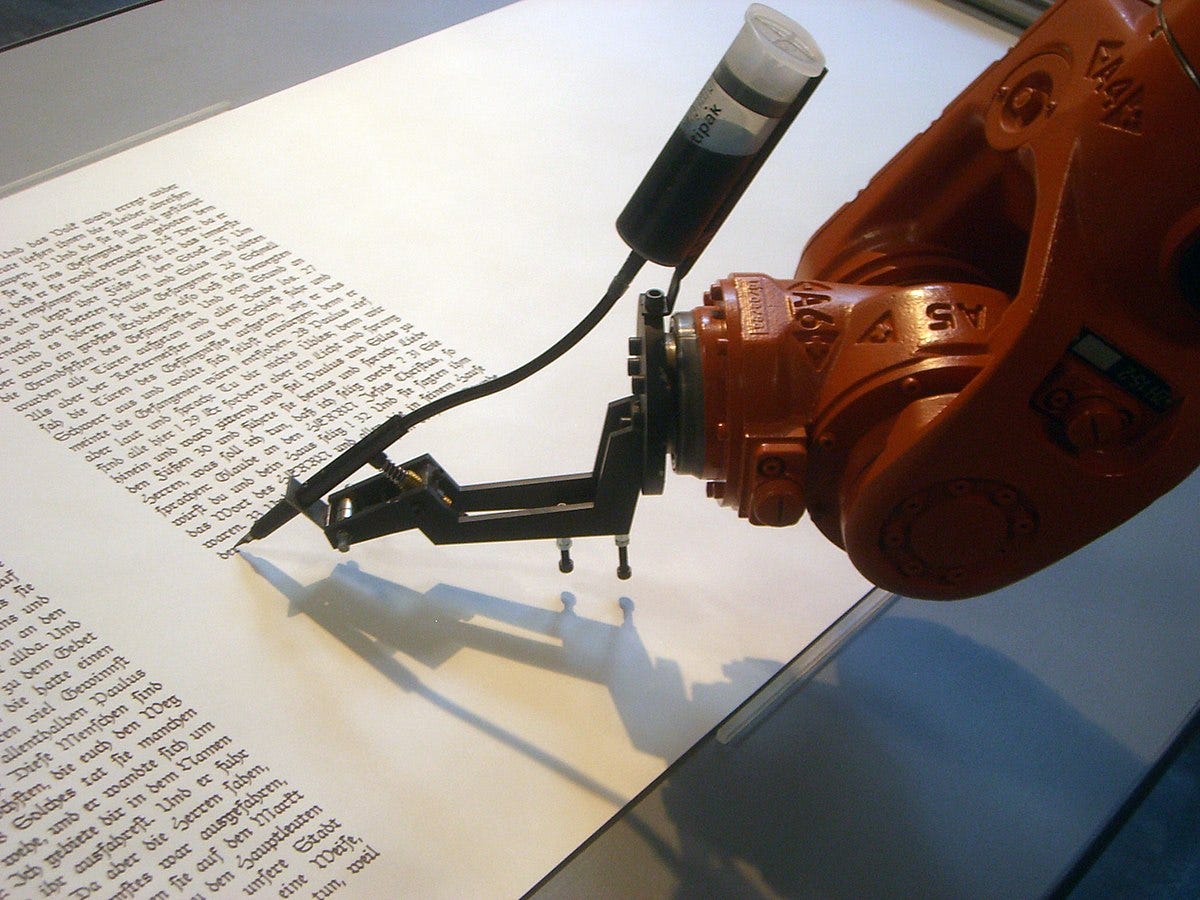
100% to this: "AI’s role in the writing process is at its infancy, and the idea that it will have absolutely no role to play in our storytelling seems as unfortunate — and as unrealistic — as the idea that it will singlehandedly bang out the next “Godfather.”
The brilliance of the W.G.A. agreement (as far as I understand it) is simply that it implicitly recognizes proper roles. AI is not a writer, and it can’t (shouldn’t) be used to replace writers. But that doesn't mean it can't be a useful tool.